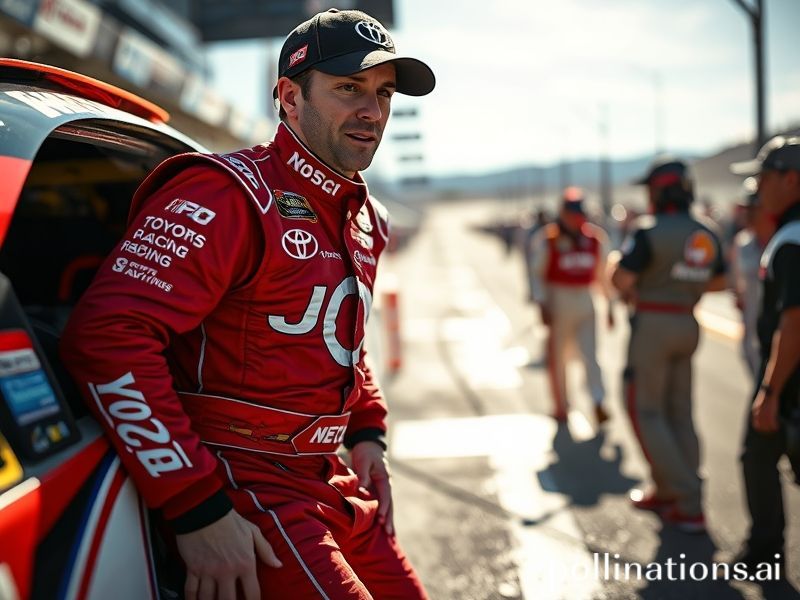Christopher Bell: How a Quiet Kid From Oklahoma Accidentally Became America’s Cheapest Form of Soft Power
Christopher Bell: The Quiet American Export Nobody Ordered—Yet Everyone Is Watching
By Our Man in the Cheap Seats, Geneva Bureau
Geneva, Switzerland – While the planet busies itself with wars, viruses, and whatever Elon is tweeting this hour, a 29-year-old from Norman, Oklahoma has become the United States’ most unlikely soft-power instrument since blue jeans and Bruce Springsteen. His name is Christopher Bell, and if you blink you’ll miss him—unless, of course, you’re in Mexico City, Sydney, or Riyadh, where audiences now set alarm clocks at ungodly hours just to see him turn left for three hundred miles at 200 mph.
Yes, Bell drives a stock car in the NASCAR Cup Series—an American pastime once dismissed abroad as “red-state polo.” Yet here we are in 2024, and global broadcasters from SuperSport to Canal+ have started slotting his races between Champions League highlights and K-drama reruns. Why? Because Bell is winning, and nothing translates across cultures like somebody else’s superiority complex wrapped in sheet-metal patriotism.
The irony is delicious. NASCAR spent decades trying to internationalize—hosting exhibition races in Japan, hiring Colombian heart-throbs, even letting Toyota in the gate—only to have a kid who sounds like a Wheaties commercial pull it off by accident. Bell doesn’t do cosmopolitan; he says “y’all” with the unapologetic frequency of a man who thinks passports come in Happy Meals. And that, dear reader, is precisely the product the world suddenly craves: unvarnished Americana at 340 g/km of CO₂.
Over in Europe, where Formula 1 has perfected the art of making billionaires look ecological, Bell’s rise is treated like a drunk uncle who just won the lottery. “Look at the colonies,” mutter the Germans, secretly streaming the race on a second monitor. In Asia, where efficiency is religion, Bell’s pit crew—six guys who change four tires in ten seconds—are being studied by Tokyo bullet-train engineers as a masterclass in applied chaos theory. And in Brazil, where Senna is still a saint, kids now practice “choque de muro” on their PlayStations, a Portuguese euphemism for bouncing off the wall in Bell’s unmistakable #20 Toyota.
Global brands have noticed. Money is talking in languages Bell probably can’t pronounce. A South Korean battery conglomerate reportedly waved $8 million just to have its logo look photogenic next to his visor. Meanwhile, a Swiss watchmaker—whose clientele normally require an offshore account and a minor royal title—has commissioned a “Bell Edition” chronograph that measures tenths of a second and, conveniently, the exact moment Western civilization peaked.
Of course, nothing this profitable remains merely sport. The U.S. State Department has begun inviting Bell to “cultural exchanges,” which is diplomat-speak for letting foreigners sit in his car and pretend the exhaust smells like freedom. Last month in Dubai, a sheikh tried to buy the race-winning Camry for his living-room décor; Bell politely declined, noting the chassis still had “some life left,” a phrase the translator rendered as “this vehicle is not yet fully depreciated”—a concept the sheikh found quaint, like public libraries or bipartisan legislation.
Meanwhile, back home, Bell’s success has triggered the usual American paroxysms: think-pieces about “NASCAR’s woke turn,” TikToks debating whether dirt-track humility is performative, and at least three congressional aides drafting bills to declare the Roval a national heritage site. All of which Bell greets with the same aw-shucks grin he wore when he was racing winged sprints for gas money and a slice of pizza. One suspects he understands what the rest of us refuse to admit: that in an age of synthetic outrage and algorithmic despair, watching a polite kid from Oklahoma outrun corporate destiny is the closest thing we have to collective therapy.
So as the season barrels toward its playoff crescendo, remember this: Christopher Bell may never learn to pronounce “Kyiv” correctly, but half the world now knows his name. And in the grand bazaar of geopolitics—where soft power is measured in Netflix deals and vaccine donations—selling the fantasy of a simpler America, one 1.5-g turn at a time, might be the most honest transaction we’ve got left.
Don’t expect the kid to save us. But if he keeps winning, at least the apocalypse will have decent commentary.







